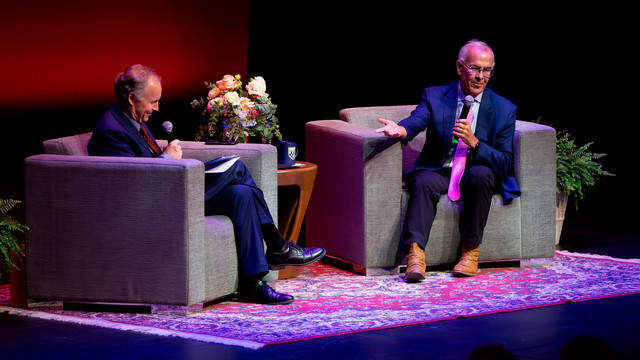David Brooks offers UR guidance on fostering genuine connections
University News
The New York Times columnist served as the keynote speaker during the 38th annual Weinstein-Rosenthal Forum on Faith, Ethics, & Global Society.
David Brooks is a bestselling author, a commentator on PBS News Hour, and an op-ed columnist at The New York Times, whose columns are among the most read in the country. He should probably also be known as a comedian. From the moment Brooks took the stage at the Modlin Center for the Arts in early October, he had the audience in stitches.
In his thoughtful talk, he provided guidance on fostering genuine connections in a society he described as “plagued by loneliness and fragmentation,” which is the focus of his latest bestseller, How to Know a Person: The Art of Seeing Others Deeply and Being Deeply Seen.
“As I’ve become more human, society is becoming dehumanized,” he said. Society, he said, is not only becoming sadder but also meaner. He cited one statistic in which a generation ago, two-thirds of Americans gave to charities. Today, the number is less than 50%.
“To take risks, we need a secure base,” Brooks said, adding that a moral order is necessary to create a secure base, which currently does not exist. “We have to have norms we all agree on. Society has become more individual-focused, but people are searching for connection and community.”
He emphasized the importance of teaching basic social skills, such as knowing how to end a conversation gracefully and making others feel seen or heard.
Brooks categorizes people into two groups — diminishers and illuminators. He describes diminishers as those who learn one fact about a person and then make stereotypes and assumptions based on it without trying to learn more. Illuminators, on the other hand, are people who make an individual feel truly seen and help others become the best versions of themselves, often by asking many questions and genuinely listening to the answers.
Steps to rebuilding good conversation
To make changes to society requires ethical leadership. One way to achieve this is by creating moral ecologies. Leaders must foster an environment where moral behavior is expected and understood, he said. People learn morals by being surrounded by others who act in considerate and kind ways.
“People are watching you more closely than you think,” he said, noting it’s important to pay attention to the smallest details.
Brooks emphasized the importance of reclaiming conversations and social trust. He shared some tips on how to achieve that:
- Be a good listener by demonstrating active interest.
- Don’t fear the pause. Give people time to think.
- Don’t be a topper, someone who constantly tries to one-up or redirect attention to themselves during a conversation.
- Ask good questions.
“A lot of conversations today are hostile,” Brooks said. When he is confronted by someone who disagrees with his view, he asks the person to share their perspective. “At least I’ve shown them the motivation of curiosity,” he said.
Strive to be defiantly human
The talk ended with a series of pre-submitted questions that University Chaplain Craig Kocher posed to Brooks. Asa Mahn, a sophomore political science and history major, asked how to be intentional about getting to know people in a university setting.
Brooks replied, “A good listener asks the extra question.”
Sophia Widmer, a sophomore gender studies and biology major, asked if remote work, technology, and digital relationships have a negative impact on society.
Brooks pointed out that social media is playing a role in society’s decline. “We just don’t treat each other with respect,” he said. “We are disembodied online.”
He also acknowledged that today’s students face significant time pressures. “It inhibits the amount of accompaniment that can happen.”
John McConnell, a sophomore majoring in political science and Russian studies, wanted to learn the best way to understand different perspectives.
Brooks suggested rephrasing the question from asking what a person believes to figuring out how they developed their belief system.
Brooks remains hopeful, despite what he described as a fragile time for society. “History has shown us patterns of rupture and repair,” he said. “We come back. Humans adapt and get creative.” He encouraged the audience to strive to be “defiantly human.”

